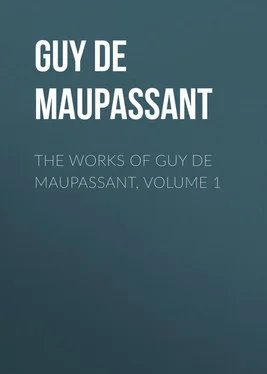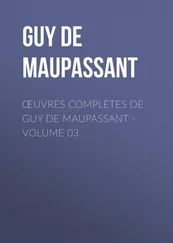Guy Maupassant - The Works of Guy de Maupassant, Volume 1
Здесь есть возможность читать онлайн «Guy Maupassant - The Works of Guy de Maupassant, Volume 1» — ознакомительный отрывок электронной книги совершенно бесплатно, а после прочтения отрывка купить полную версию. В некоторых случаях можно слушать аудио, скачать через торрент в формате fb2 и присутствует краткое содержание. Жанр: literature_19, foreign_antique, foreign_prose, на английском языке. Описание произведения, (предисловие) а так же отзывы посетителей доступны на портале библиотеки ЛибКат.
- Название:The Works of Guy de Maupassant, Volume 1
- Автор:
- Жанр:
- Год:неизвестен
- ISBN:нет данных
- Рейтинг книги:4 / 5. Голосов: 1
-
Избранное:Добавить в избранное
- Отзывы:
-
Ваша оценка:
- 80
- 1
- 2
- 3
- 4
- 5
The Works of Guy de Maupassant, Volume 1: краткое содержание, описание и аннотация
Предлагаем к чтению аннотацию, описание, краткое содержание или предисловие (зависит от того, что написал сам автор книги «The Works of Guy de Maupassant, Volume 1»). Если вы не нашли необходимую информацию о книге — напишите в комментариях, мы постараемся отыскать её.
The Works of Guy de Maupassant, Volume 1 — читать онлайн ознакомительный отрывок
Ниже представлен текст книги, разбитый по страницам. Система сохранения места последней прочитанной страницы, позволяет с удобством читать онлайн бесплатно книгу «The Works of Guy de Maupassant, Volume 1», без необходимости каждый раз заново искать на чём Вы остановились. Поставьте закладку, и сможете в любой момент перейти на страницу, на которой закончили чтение.
Интервал:
Закладка:
I wished also to look down the well, hoping I would be able to clear up the mystery, and perched myself close to its brink. I perceived, indistinctly, a white object. What could it be? I then conceived the idea of lowering a lantern at the end of a cord. When I did so, the yellow flame danced on the layers of stone and gradually became clearer. All the four of us were leaning over the opening, Sapeur and Céleste having now joined us. The lantern rested on a black and white, indistinct mass, singular, incomprehensible. Sapeur exclaimed:
"It is a horse. I see the hoofs. It must have escaped from the meadow, during the night, and fallen in headlong."
But, suddenly, a cold shiver attacked my spine, I first recognized a foot, then a clothed limb; the body was entire, but the other limb had disappeared under the water.
I groaned and trembled so violently that the light of the lamp danced hither and thither over the object, discovering a slipper.
"It is a woman! who … who … can it be? It is Miss Harriet."
Sapeur alone did not manifest horror. He had witnessed many such scenes in Africa.
Mother Lecacheur and Céleste began to scream and to shriek, and ran away.
But it was necessary to recover the corpse of the dead. I attached the valet securely by the loins to the end of the pulley-rope, and I lowered him slowly, and watched him disappear in the darkness. In the one hand he had a lantern, and held on by the rope with the other. Soon I recognized his voice, which seemed to come from the center of the earth, crying:
"Stop."
I then saw him fish something out of the water. It was the other limb. He then bound the two feet together, and shouted anew:
"Haul up."
I commenced to wind him up, but I felt my arms crack, my muscles twitch, and I was in terror lest I should let the man fall to the bottom. When his head appeared at the brink, I asked:
"Well, what is it?" as though I only expected that he would inform me of what he had discovered at the bottom.
We both got on to the stone slab at the edge of the well, and, face to face, we hoisted the body.
Mother Lecacheur and Céleste watched us from a distance, concealed from view behind the wall of the house. When they saw, issuing from the hole, the black slippers and the white stockings of the drowned person, they disappeared.
Sapeur seized the ankles of the poor chaste woman, and we drew it up, sloping, as it was, in the most immodest posture. The head was shocking to look at, being bruised and black; and the long, gray hair, hanging down tangled and disordered.
"In the name of all that is holy, how lean she is!" exclaimed Sapeur, in a contemptuous tone.
We carried her into the room, and as the women did not put in an appearance, I, with the assistance of the stable lad, dressed the corpse for burial.
I washed her disfigured face. To the touch of my hand, an eye was slightly opened, which regarded me with that pale regard, with that cold look, with that terrible look that corpses have, which seemed to come from beyond life. I plaited up, as well as I could, her disheveled hair, and I adjusted on her forehead, a novel and singularly formed lock. Then I took off her dripping wet garments, baring, not without a feeling of shame, as though I had been guilty of some profanation, her shoulders and her chest, and her long arms, as slim as the twigs of branches.
I next went to fetch some flowers, corn poppies, blue beetles, marguerites, and fresh and perfumed herbs, with which to strew her funeral couch.
I being the only person near her, it was necessary for me to perform the usual ceremonies. In a letter found in her pocket, written at the last moment, it was ordered that her body was to be buried in the village in which she had passed the last days of her life. A frightful thought then pressed on my heart. Was it not on my account that she wished to be laid to rest in this place?
Towards the evening, all the female gossips of the locality came to view the remains of the defunct; but I would not allow a single person to enter; I wanted to be alone; and I watched by the corpse the whole night.
I looked at the corpse by the flickering lights of the candles, this miserable woman, wholly unknown, who had died lamentably and so far away from home. Had she left no friends, no relations behind her? What had her infancy been? What had been her life? Whence had she hailed thither thus, all alone, wanderer, lost like a dog driven from its home? What secrets of sufferings and despair were sealed up in that disagreeable body, in that spent, tarnished body – tarnished during the whole of its existence, that impenetrable envelope which had driven her far away from all affection, from all love?
How many unhappy beings there are! I felt that there weighed upon that human creature the eternal injustice of implacable nature! It was all over with her, without her ever having experienced, perhaps, that which sustains the greatest outcasts – to wit, the hope of being loved for once! Otherwise, why should she thus have concealed herself, fled from the face of the others? Why did she love everything so tenderly and so passionately, everything living that was not a man?
I recognized, also, that she believed in a God, and that she hoped to receive compensation from the latter for all the miseries she had endured. She had begun now to decompose, and to become, in turn, a plant. She who had blossomed in the sun, was now to be eaten up by the cattle, carried away in seeds, and flesh of beasts, would become again human flesh. But that which is called the soul, had been extinguished at the bottom of the dark well. She suffered no longer. She had changed her life for that of others yet to be born.
Hours passed away in this silent and sinister communion with the dead. A pale light at length announced the dawn of a new day, when a bright ray glistened on the bed, shed a dash of fire on the bed clothes and on her hands. This was the hour she had so much loved, when the awakened birds began to sing in the trees.
I opened the window to its fullest extent, I drew back the curtains, so that the whole heavens might look in upon us, and bending towards the glassy corpse, I took in my hands the mutilated head; then, slowly, without terror or disgust, I imprinted a kiss, a long kiss, upon those lips, which had never before received any.
Léon Chenal remained silent. The women wept. We heard on the box seat the Count d'Etraille, who blows his nose, from time to time. The coachman alone had gone to sleep. The horses, which felt no longer the sting of the whip, had slowed their pace and dragged along softly, and the brake, hardly advancing at all, became suddenly torpid, as if it had been charged with sorrow.
FRANCESCA AND CARLOTTA RONDOLI
I
No (said my friend Charles Jouvent), I do not know Italy; I started to see it thoroughly twice, and each time I was stopped at the frontier and could not manage to get any further. And yet my two attempts gave me a charming idea of the manners of that beautiful country. I must, however, some time or other visit its cities, as well as the museums and works of art with which it abounds. I will also make another attempt to penetrate into the interior, which I have not yet succeeded in doing.
You don't understand me, so I will explain myself: In the spring of 1874 I was seized with an irresistible desire to see Venice, Florence, Rome, and Naples. I am, as you know, not a great traveler; it appears to me a useless and fatiguing business. Nights spent in a train, the disturbed slumbers of the railway carriage, with the attendant headache, and stiffness in every limb, the sudden waking in that rolling box, the unwashed feeling with your eyes and hair full of dust, the smell of the coal on which one's lungs feed, those bad dinners in the draughty refreshment rooms are, according to my ideas, a horrible way of beginning a pleasure trip.
Читать дальшеИнтервал:
Закладка:
Похожие книги на «The Works of Guy de Maupassant, Volume 1»
Представляем Вашему вниманию похожие книги на «The Works of Guy de Maupassant, Volume 1» списком для выбора. Мы отобрали схожую по названию и смыслу литературу в надежде предоставить читателям больше вариантов отыскать новые, интересные, ещё непрочитанные произведения.
Обсуждение, отзывы о книге «The Works of Guy de Maupassant, Volume 1» и просто собственные мнения читателей. Оставьте ваши комментарии, напишите, что Вы думаете о произведении, его смысле или главных героях. Укажите что конкретно понравилось, а что нет, и почему Вы так считаете.












